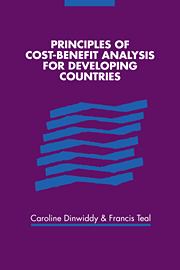Book contents
- Frontmatter
- Contents
- List of figures
- List of economic models and tables
- Preface
- Part I: Introduction to welfare economics
- Part II: Project and policy appraisal in developing countries
- 5 Project appraisal: an overview
- 6 Shadow prices for traded and non-traded commodities in an open economy
- 7 Trade policy, exchange rates and structural adjustment
- 8 Labour markets in developing countries
- 9 The social value of labour
- 10 Intertemporal costs and benefits (1): a market-based approach
- 11 Intertemporal costs and benefits (2): a social planning approach
- Part III: Missing markets
- Retrospect
- Bibliography
- Index
6 - Shadow prices for traded and non-traded commodities in an open economy
Published online by Cambridge University Press: 22 October 2009
- Frontmatter
- Contents
- List of figures
- List of economic models and tables
- Preface
- Part I: Introduction to welfare economics
- Part II: Project and policy appraisal in developing countries
- 5 Project appraisal: an overview
- 6 Shadow prices for traded and non-traded commodities in an open economy
- 7 Trade policy, exchange rates and structural adjustment
- 8 Labour markets in developing countries
- 9 The social value of labour
- 10 Intertemporal costs and benefits (1): a market-based approach
- 11 Intertemporal costs and benefits (2): a social planning approach
- Part III: Missing markets
- Retrospect
- Bibliography
- Index
Summary
For the first two decades after the Second World War policies for promoting growth and development in the poorer countries of the world were typically based on programmes of industrialisation behind tariff barriers. As discussed briefly in chapter 5, disillusion followed; mounting empirical evidence suggested that import substitution frequently led to a mis-allocation of resources which not only failed to fuel a sustained rise in per capita incomes but, in extreme cases, actually led to a drop in welfare in developing countries. The UNIDO and the Little and Mirrlees manuals for project appraisal, published in the early 1970s, proved to be important landmarks in a reappraisal of appropriate trade policies for less developed countries, based on the rediscovery of the gains from trade. The key recommendation of Little and Mirrlees was that commodities used by, or produced by, the public sector should be valued in terms of their world prices or foreign exchange equivalence. The rationale for using world price and foreign exchange equivalent shadow prices and the precise interpretation of these terms are discussed in section 6.1 of this chapter.
The foreign exchange equivalence approach to shadow pricing is not the only one, and in this chapter we also discuss and demonstrate the procedure for shadow pricing based on the principles introduced in part I. This approach generates an alternative set of formulas for shadow pricing non-traded commodities in an economy with tax distortions.
- Type
- Chapter
- Information
- Principles of Cost-Benefit Analysis for Developing Countries , pp. 97 - 116Publisher: Cambridge University PressPrint publication year: 1996



